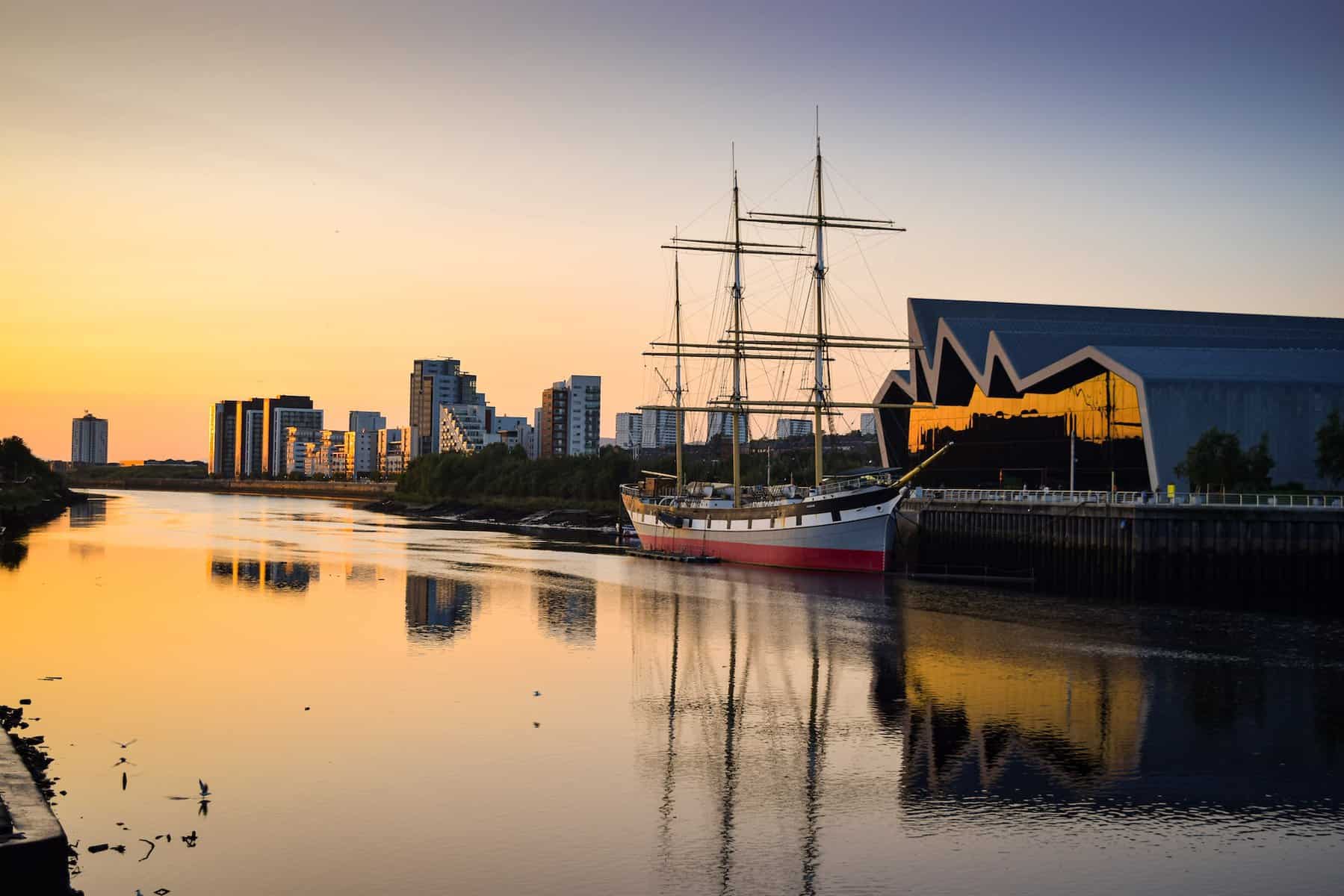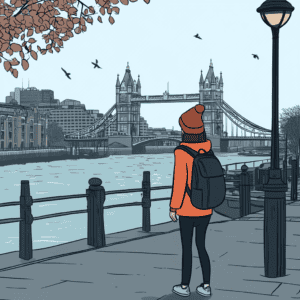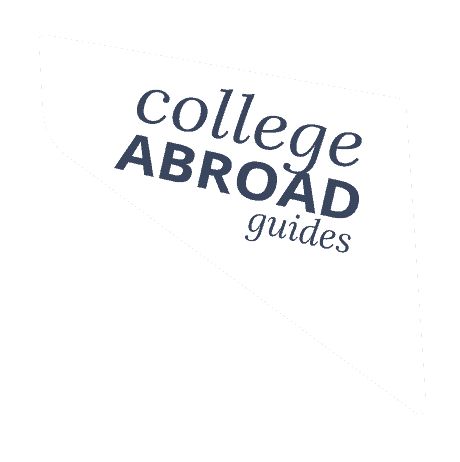Cali Dreaming: What is Glasgow Caledonian University Like?

- Originally published
Table of Contents
Is it Calley, Cali, Cally, or Caley? Even the students don’t know how to spell Glasgow Caledonian’s nickname. But there’s one thing the students we spoke to did know: Glasgow Caledonian University is the sleeper hit of Scotland for work experience. Students who attend not only gain a near-ideal Glasgow location, they often get multiple work placements, experience writing a senior thesis (called a dissertation here, but not to be confused with a graduate-level research piece), and proficiency in their fields that other undergrads can only imagine. But what is Glasgow Caledonian University like? We wanted to know what it feels like. We asked a bunch of students, then pestered them by DM for follow-up questions, including what they loved, hated, and basically – what you’d know if you were a student.
So you can know. Before you’re a student.
Here’s what we learned.
Basics for Beginners
Degrees: LLB, BA, BSc, BEng
Majors: Applied programs galore, from vision science to podiatry, optometry, nursing, multimedia journalism, social work, fashion, marketing, electrical engineering, cybersecurity, and audio technology. Purely academic programs are scant. You can take a general social sciences program, but even so, you’ll find it oriented toward present social and political issues like immigration and globalization.
Location: Glasgow city center, Glasgow, Lanarkshire, Scotland
Cost for out-of-EU: £14,500 for most programs, including games development, biological sciences, the bachelor of laws program, and electrical engineering.
On-campus housing cost: £114 weekly (no bathroom) or £145 weekly (en suite) with a 41-week lease totaling £4,674 and £5,535 annually.
FAFSA Funds: Yes
Abroad from abroad: Yes.Short-term, semester, and year-long programs. Short-term summer programs are few: there are typically a few programs, just one of which is multidisciplinary, so if others don’t cover your program, you may just have a single option. Semester and year-long programs are most robust with former EU Erasmus partner universities.
Student body: 22,000 from 120 countries. With campuses in Glasgow, London, and New York, GCU (both are small, postgraduate institutions), GCU has outreach across borders.
Five adjectives: resourceful, central, diverse, modern, vibrant
Student Life in Central Glasgow
It’s often a rival to the University of the West of Scotland, so it makes sense that students trying to distinguish these two vocationally-minded universities in Scotland’s largest city look long and hard at the neighborhoods where they’ll spend most of their time. In the case of GCU, that’s close to the center of Glasgow.
It’s less than a mile from the train station, right in the middle of the action. Along with the University of Strathclyde, GCU students have one of the best urban locations in Scotland. Don’t be fooled: you won’t find campus in a charming old town with cobblestone streets. Thoroughfares around here can be oddly broad, and the vibe a little too suburban for the location. Head under the highway just north of campus, and you’ll start to notice wide, grassy berms and ample parking spots quickly.
However, students at GCU are still very much part of the urban symphony of modern Glasgow. Music aficionados find they’re practically across the street from the magnificent Glasgow Royal Concert Hall. The Theatre Royal Glasgow is on another nearby corner. You’ll bump into Strathclyde students heading down Hanover Street toward the river and the city’s main shopping area, called the “Merchant City” neighborhood.
When you make it to the Scott Monument in George Square, you’re in the heart of old Glasgow’s once formidable power. Built in the late 18th century along with Glasgow’s Hunterian Museum, the ship-building industrial city was expanding here at a time when Glasgow was described as the UK’s second city, a place that was clean, beautiful, and prosperous.
All that changed in the post-war economy mid-50s when service industries began eclipsing things like locomotive building and shipping. Glasgow struggled in the last half of the 20th century, but there are signs it’s coming back to life.
Glasgow is one of the best cities in the UK for students. It’s more affordable than many places, though that’s changing. It’s got a mix of urban spaces and parks, great arts and things to do.
From George Square, you’re surrounded by murals, so take a walk if you’re an arts management student. Stop into museums like the Kelvingrove Art Gallery or the Riverside Museum (both are free). Not that you need to go inside. Glasgow has one of Europe’s biggest civil arts collections, so it’s all around you. And the Convention Bureau counted: Glasgow has over 130 live music gigs to attend every week.
Glasgow is the capital of the music scene in Scotland. For arts, it’s a toss up with Edinburgh but if I need to see a band, chances are it’s stopping in Glasgow and that’s not always true for Edinburgh.
Needless to say, GCU isn’t the school for you if you are easily distracted.
For LBGTQ or students of color seeking friendly spaces, the big city life can be attractive. Though it may be due to hot-button issues like trans rights percolating through the entire western world at the same time, it’s also true that Scotland has specifically started feeling less friendly for LGBTQ students in the past 5 years. Where 81% of students felt welcomed in 2017, just 65% do today. Nevertheless, you’ll find more gay and lesbian pubs and clubs here than anywhere else in Scotland.
Over the same time period, racial discrimination is holding steady in Scotland: about 45% Of black Scottish students (and 29% of Asians) report they’ve been discriminated against over the past year. And about 25% report their schools have a serious problem with racism.
For students who come to 96% white Scotland, they find the world’s “friendliest city” in Glasgow, but they may also find it tough to find resources, from support to groceries, familiar products, safe spaces, and friends of color.
The Caledonian Campus
Nestled amidst shops, cafes, and cultural hotspots, GCU offers a vibrant student experience that feels deeply connected to the city’s pulse.
It’s modern, bright, and airy. It’s a 5-minute walk to Glasgow city center but it’s also quiet. It’s the perfect location. The campus really impressed me and was part of my decision to attend.
The Saltaire Center is GCU’s student hub. It houses the Sir Alex Ferguson Library, with spacious interiors and geometric architecture. It’s a quiet retreat amidst the urban hustle. Named after the legendary soccer (football) manager, the library is well-equipped with technology, study spaces, and, of course, a treasure trove of books. Hit it up after class to get some afternoon group projects completed. It’s a beehive of campus action, and even comes with airport-style screens ticking away the campus (and BBC) news and displaying announcements.
The group project center has a few cozy alcoves to create a sense of privacy, but you’ll still find tons of noise most days during term. There’s a level for private studies, and in general, the more you climb, the quieter things get. There are four total floors to explore in this cavernous space. Just beware: you’ll likely find chatter on every level of this busy student hub.
On other floors, there are the career center, wellbeing, student support services and a 600-student café. The campus life desk is your go-to when things go wrong. If they can’t help, they know who can. Students told us they had no issues getting student cards replaced and other non-academic needs met. That may be in part because of GCU’s in-person help desk.
The busy bee atmosphere of so many university services in one place might stem from one of GCU’s unique and worthy missions: to open up educational access and provide services for students regardless of their backgrounds. Making things easier and accessible for students is baked into the design of this campus hotspot. The university also lets community members have borrowing privileges, so you might see regular Glaswegians strolling through the stacks to pick up a little light reading.
Fitness and Clubs at Caledonian
Also, while the campus does offer sports facilities through the Arc Health & Fitness, the options are somewhat limited compared to larger, sprawling campuses. Those passionate about a wide range of sports might find this underwhelming. Besides, you’ll have to pay monthly to access the Arc. However, there are ample opportunities to get fit. Join a club and learn netball, or sign up for the snow sports club just in time for a week abroad trip. Sports clubs are active, and students who want to train their bodies along with their minds can find ways to get involved.
Not sporty? That’s ok, too. There are 100 clubs and societies on campus, reflecting GCU’s large, diverse student body. That doesn’t include an international society or any specific clubs for Americans. Instead, you’ll find there are organized Indian, Malaysian, Igbo, Ukranian, and Nigerian societies.You’ll also find hobby-based clubs, from drama to pole dancing.
Live in student housing and you’ll meet tons of students, including many international students who find this a great place to meet people. Caledonian Court is GCU’s sole student dorm.
While there are privately owned student dorms nearby, Glasgow has a housing shortage that’s worth considering upfront. If you can’t get housing, what neighborhoods and private options will you be able to find? Few are sure these days. This year, 20% of students weren’t able to secure accommodation as of August for the fall semester. Further, the student to bed ratio in Glasgow has climbed to 4:1.
It was really difficult to find student housing. There are new accommodations getting built all the time, you can see it around town. But it’s not enough to meet demand.
A strange aspect of the accommodation here is that the groups of student rooms in “flats” that make up small units here share just a kitchen — no common room. So you won’t see a couch in sight, and barring cooking with friends, you’ll have to hang inside a bedroom and host your flatmates there.
Most students with a good experience at Caledonian Court still bail their second year and find housing in the private market. More than one student told us that “cheaper” isn’t the issue: they call other private housing in the market “better.” They get lounges, private bathrooms, and the same great downtown access, close to class.
With a housing crunch, that choice can sometimes be a luxury. This is one of the biggest downsides to GCU, as students here came for the program and location, not the accommodation.
Academics at Glasgow Caledonian University
At Glasgow Caledonian University (GCU), the curriculum is rooted in real-world applications.
As a student, the emphasis on “Common Good” and commitment to social responsibility in academics. That mission helps attract students who want to dedicate their careers to improving society, regardless of which programs they plan on using to make their world-changing happen. And that’s ok, because GCU’s academic prowess extends across disciplines, offering a diverse palette of courses that cater to varied interests.
What particularly stands out is the distinctive blend of theoretical and practical education in programs such as the Vision Sciences department, which is one of the few in the UK to offer courses in Optometry. As you might expect in a field that serves patients, there program emphasizes hands-on clinical experience alongside academic learning. Vision Sciences students might rightfully say they’re well-prepared for their careers.
We get a lot of practical experience. In Human Nutrition and Dietetics, there are multiple work placements and so I have a good sense already that the course if relevant to what I will need in the workplace.
Another gem in GCU’s academic crown is the Moffat Centre for Travel and Tourism Business Development, which is UK’s largest university-based consultancy and research centre for the tourism market. It offers students unparalleled exposure to the tourism industry.
Clients here include VisitScotland, for whom the center provides data on overnight stays and the habits of tourists. Want to know whether caravan camping (using camper trailers) is growing in Scotland? So do tourism boards! The consultancy also offers attraction reports and monitoring. Students interested in growing tourism businesses benefit from extensive research chops in Glasgow.
The university also offers some unique programs in areas such as Fashion Business, International Economic and Social Justice, and Risk Management, integrating social responsibility and real-world application into the coursework.
Students at Caley really want to get out in the real world, but they work hard while they’re here. Expect to have tutors with tons of industry experience who can really help because they’ve been exactly where you are now.
However, despite the enthusiasm for these programs, there are aspects where GCU could improve. Some students feel that there could be a broader array of elective courses to explore interests outside their main field of study. The relatively narrow focus can be limiting for students who thrive in interdisciplinary environments.
While Scotland’s 4-year university degrees typically allow for wiggle room than England’s 3-year plans, GCU tailors student paths pretty tightly across the 4 years. That could be because they cram in so much work experience that students hardly have time to theorize about related fields (many students applaud that). However, for those who aren’t yet sure about their future path, the intensity and focus of a GCU degree can be stifling.
Additionally, the university’s push towards practical, career-oriented learning sometimes overshadows the emphasis on theoretical depth in certain fields. For students who aspire to delve deeply into the theoretical aspects of their discipline, this approach may fall short of expectations.
Working in the radio station was one of the best parts of my course. It was very hands-on. Students also like the opportunity to think about what’s working in other radio shows and what isn’t. But for someone interested in the history or meaning of media, the program very quickly transitions out of that and into production.
In essence, GCU presents a compelling academic landscape with its unique programs, commitment to social responsibility, and a career-focused curriculum. However, ensuring consistent teaching quality and expanding the course offerings could elevate the experience for students with diverse learning aspirations, or those who start to realize new goals over the course of their 4 years there.
Want to Apply to GCU?
GCU has diverse requirements, like an interview for programs like nursing. Most students will need a 2.7 GPA and good grades in relevant subjects. If you can support your application with test scores, you’ll want to have 2 AP tests of 3 or higher, an SAT score over 1000, or ACT score of 24. GCU considers a range of comparable credentials, so if you have subject tests or other feathers in your cap, you can submit them for consideration.
You’ll use UCAS (the UK common admissions portal) to apply by June 30. Applications and admissions are rolling, so applying much earlier in the process can help you land an available spot, as well as give you time to consider your options, accept an offer, and get your paperwork in order before term.
Still on the Hunt for the Perfect University?
Caledonian gets its top scores for location and a hands-on introduction to the world of work in a vibrant, modern Scotland. To us, that sounds a lot like Edinburgh Napier, so give that university a look-over if your program is represented and practical coursework is your dream. In Glasgow, look to the University of the West of Scotland, Glasgow University, and the University of Strathclyde for the same great location and a different university vibe.
And if you haven’t checked out the costs associated with university in Scotland, check out the damage, the top international picks, and the basics of what you should know about college in Scotland.
Related Posts

Jessica Share
Jessica is the writer, Ph.D., and mom-of-an-abroad-student-in-the-UK at the helm of College Abroad Guides. When she's not asking college students where the coolest place to hang out in their city is, she's figuring out how she can make $60 imported Greek oregano potato chips and £50 British bacon potato chips appear on her doorstep for the cost of a local bag of Lay's.





